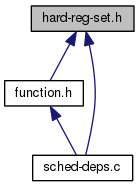Go to the source code of this file.
Typedef Documentation
Define the type of a set of hard registers.
HARD_REG_ELT_TYPE is a typedef of the unsigned integral type which
will be used for hard reg sets, either alone or in an array.
If HARD_REG_SET is a macro, its definition is HARD_REG_ELT_TYPE,
and it has enough bits to represent all the target machine's hard
registers. Otherwise, it is a typedef for a suitably sized array
of HARD_REG_ELT_TYPEs. HARD_REG_SET_LONGS is defined as how many.
Note that lots of code assumes that the first part of a regset is
the same format as a HARD_REG_SET. To help make sure this is true,
we only try the widest fast integer mode (HOST_WIDEST_FAST_INT)
instead of all the smaller types. This approach loses only if
there are very few registers and then only in the few cases where
we have an array of HARD_REG_SETs, so it needn't be as complex as
it used to be.
Function Documentation
| static bool hard_reg_set_empty_p |
( |
| ) |
|
|
inlinestatic |
| static bool hard_reg_set_equal_p |
( |
| ) |
|
|
inlinestatic |
| static bool hard_reg_set_intersect_p |
( |
| ) |
|
|
inlinestatic |
| static void hard_reg_set_iter_next |
( |
| ) |
|
|
inlinestatic |
| static bool hard_reg_set_iter_set |
( |
| ) |
|
|
inlinestatic |
Return false when we're advanced past the end of the set.
Find the correct bit and return it.
Round to the beginning of the next word.
Find the next non-zero word.
| static bool hard_reg_set_subset_p |
( |
| ) |
|
|
inlinestatic |
Variable Documentation
| char global_regs[FIRST_PSEUDO_REGISTER] |
Define some standard sets of registers.
Indexed by hard register number, contains 1 for registers
that are being used for global register decls.
These must be exempt from ordinary flow analysis
and are also considered fixed.
Indexed by hard register number, contains 1 for registers
that are being used for global register decls.
These must be exempt from ordinary flow analysis
and are also considered fixed.
Referenced by debug_candidate(), fprint_ul(), merge_overlapping_regs(), and split_all_insns().
| const char* reg_class_names[] |

